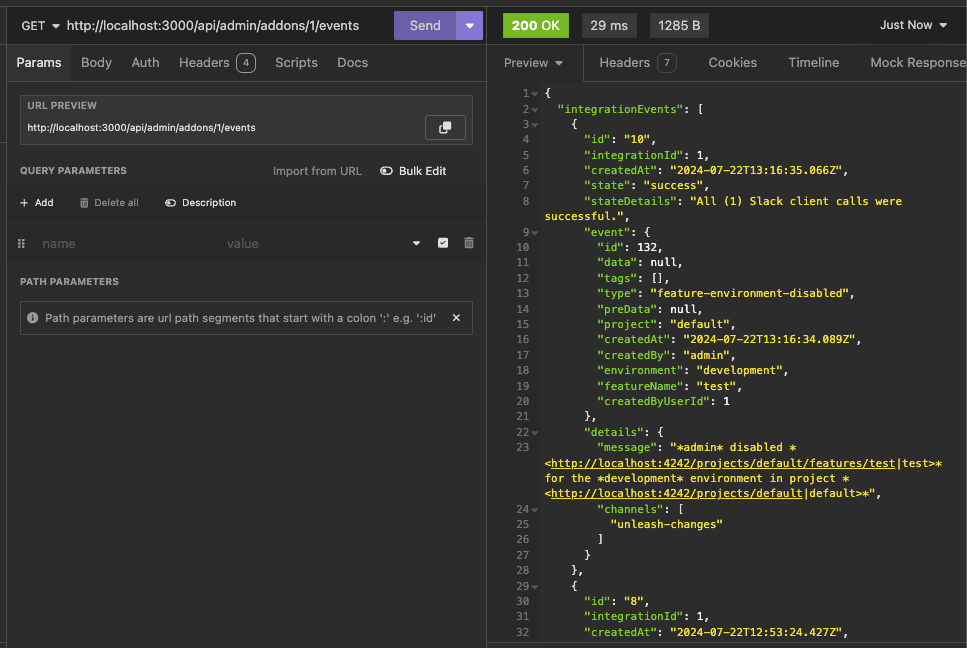Adding project status schema definition, controller, service, e2e test.
Next PR will add functionality for activity object.
---------
Co-authored-by: Thomas Heartman <thomas@getunleash.io>
Adds an endpoint to return all event creators.
An interesting point is that it does not return the user object, but
just created_by as a string. This is because we do not store user IDs
for events, as they are not strictly bound to a user object, but rather
a historical user with the name X.
https://linear.app/unleash/issue/2-2439/create-new-integration-events-endpointhttps://linear.app/unleash/issue/2-2436/create-new-integration-event-openapi-schemas
This adds a new `/events` endpoint to the Addons API, allowing us to
fetch integration events for a specific integration configuration id.

Also includes:
- `IntegrationEventsSchema`: New schema to represent the response object
of the list of integration events;
- `yarn schema:update`: New `package.json` script to update the OpenAPI
spec file;
- `BasePaginationParameters`: This is copied from Enterprise. After
merging this we should be able to refactor Enterprise to use this one
instead of the one it has, so we don't repeat ourselves;
We're also now correctly representing the BIGSERIAL as BigInt (string +
pattern) in our OpenAPI schema. Otherwise our validation would complain,
since we're saying it's a number in the schema but in fact returning a
string.
This PR fixes how Unleash handles tag values. Specifically, it does
these things:
1. Trims leading and trailing whitespace from tag values before
inserting them into the database
2. Updates OpenAPI validation to not allow whitespace-only and to ignore
leading and trailing whitespace
Additionally, it moves the tag length constants into the constants file
from the Joi tag schema file. This is because importing the values
previously rendered them as undefined (probably due to a circular
dependency somewhere in the system). This means that the previous values
were also ignored by OpenAPI.
UI updates reflecting this wil follow.
## Background
When you tag a flag, there's nothing stopping you from using an entirely
empty tag or a tag with leading/trailing whitespace.
Empty tags make little sense and leading trailing whitespace differences
are incredibly subtle:

Additionally, leading and trailing whitespace is not shown in the
dropdown list, so you'd have to guess at which is the right one.

## About the changes
Removes the deprecated state endpoint, state-service (despite the
service itself not having been marked as deprecated), and the file
import in server-impl. Leaves a TODO in place of where file import was
as traces for a replacement file import based on the new import/export
functionality
1. Added new schema and tests
2. Controller also accepts the data
3. Also sending fake data from frontend currently
Next steps, implement service/store layer and frontend
This PR adds an endpoint to Unleash that accepts an error message and
option error stack and logs it as an error. This allows us to leverage
errors in logs observability to catch UI errors consistently.
Considered a test, but this endpoint only accepts and logs input, so I'm
not sure how useful it would be.
Adds a new Inactive Users list component to admin/users for easier cleanup of users that are counted as inactive: No sign of activity (logins or api token usage) in the last 180 days.
---------
Co-authored-by: David Leek <david@getunleash.io>
Adding new project overview endpoint and deprecating the old one.
The new one has extra info about feature types, but does not have
features anymore, because features are coming from search endpoint.
We love all open-source Unleash users. in 2022 we built the [segment
capability](https://docs.getunleash.io/reference/segments) (v4.13) as an
enterprise feature, simplify life for our customers.
Now it is time to contribute it to the world 🌏
---------
Co-authored-by: Thomas Heartman <thomas@getunleash.io>
This PR adds an operation and accompanying openapi docs for the new
"update feature type lifetime" API operation.
It also fixes an oversight where the other endpoint on the same
controller didn't use `respondWithValidation`.
Note: the API here is a suggestion. I'd like to hear whether you agree
with this implementation or not.